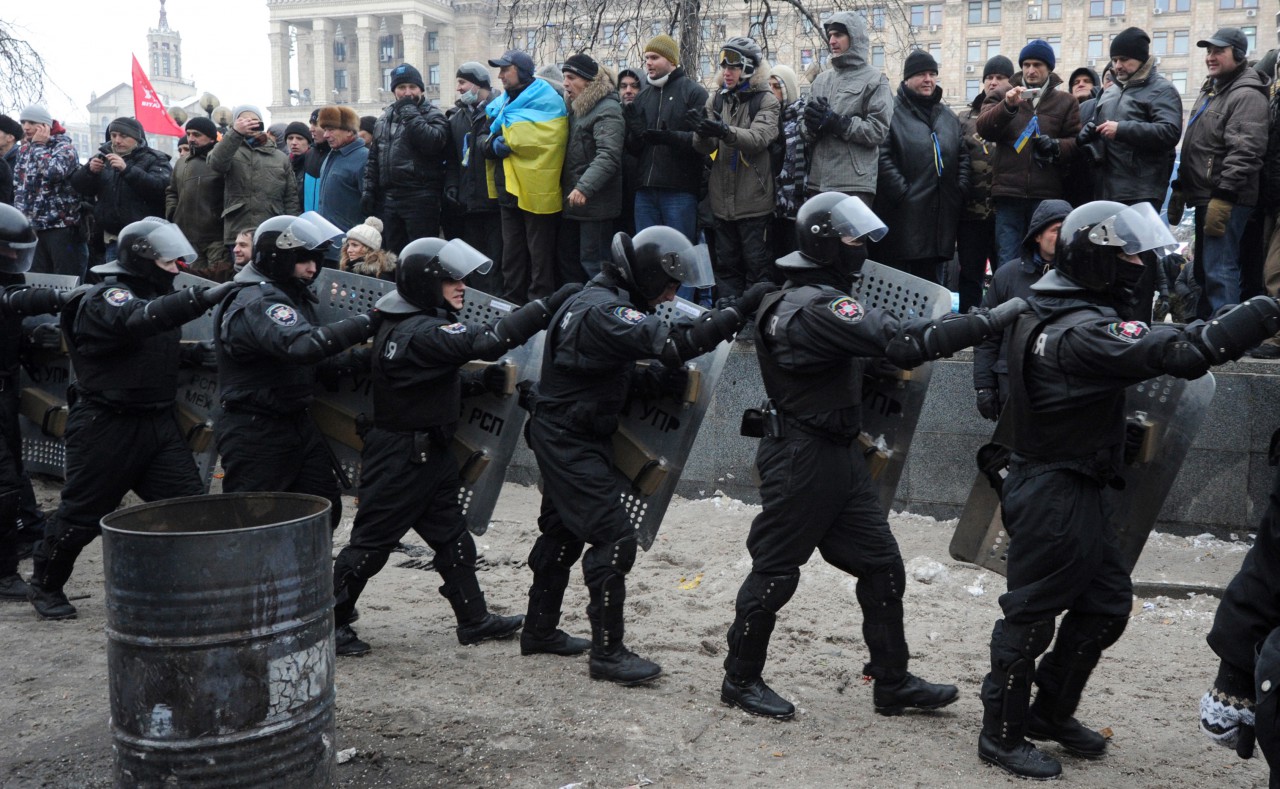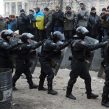
Putin Pushing Back Against the West and Its Presumed Agents
Publication: Eurasia Daily Monitor Volume: 10 Issue: 223
By:

This week (December 10), the Russian Duma discussed the political crisis in Ukraine and passed unanimously a resolution condemning the Ukrainian opposition, which is demanding the resignation of the government of Prime Minister Mykola Azarov for refusing to sign an association and free-trade agreement with the European Union. The Duma resolution lambasted the West for “intervening in Ukrainian internal affairs,” provoking and supporting illegal actions. According to Duma Foreign Relations Committee chairman, Alexei Pushkov, “The protesters in Kyiv are an aggressive minority,” attempting to impose their will on the Ukrainian people, while the EU is attempting “to tear away Ukraine from Russia” (https://www.interfax.ru/print.asp?sec=1448&id=345922). The Duma condemned “unsanctioned rallies, the blocking and occupation of government buildings, and pogroms.” The destruction by protesters of an effigy of Vladimir Lenin in Kyiv was also condemned. The chairman of the Duma Commonwealth of Independent States (CIS) Affairs Committee, Leonid Slutsky, insisted the present conflict in Ukraine “is a fight between the supporters of a Eurasian integration and its opponents.” The leader of the Just Russia party, Sergei Mirinov alleged: “This is an attempt to destroy a Slavic Union” (https://www.kommersant.ru/doc/2365001).
On December 11, during the night and early morning, Ukrainian riot police attempted to dislodge protesters from central Kyiv, forcibly dismantling street barricades and tents, but did not succeed after meeting stiff, though mostly non-violent opposition, and they eventually withdrew. On The same day, Carl Bildt, the Swedish foreign minister, apparently mirroring sentiments expressed in the Duma, was quoted by the Ukrainian press as describing the clashes on the streets of Kyiv as “repressions against reforms” and “Europe against Eurasia” (https://rus.newsru.ua/ukraine/11dec2013/vozderj.html).
At present, the standoff in Ukraine continues and its end outcome is unclear. The Ukrainian economy and finances are in dire straits, and Moscow believes it can offer Ukrainian President Viktor Yanukovych a better deal than Brussels. Moscow’s pressure may push his government into agreeing to join a Eurasian Union led by Russia. Russian officials express hope that frosty winter weather, together with the coming New Year and Christmas celebrations may deplete the ranks of the protesters, while firm action by Ukrainian authorities may “restore order in the streets” (https://www.kommersant.ru/doc/2351932).
However, the forces Yanukovych may actually use are limited. Ukraine’s crack riot police special forces—Berkut—which, for several weeks, have been at the forefront of attempts to contain and suppress mass protests in Kyiv, are just over 3,000 men strong (https://www.kommersant.ru/doc/2352137). Apparently most of the Berkut and available Interior Troops units have already been concentrated in Kyiv (https://interfax.com.ua/news/general/181065.html). These forces are capable of dispersing protesters in this or that location in Kyiv’s center, but their numbers and their battle morale seem insufficient to effectively impose martial law and curfew in the entire city or throughout Ukraine if a state of emergency is declared as some in Moscow have apparently been advocating (see EDM, December 5).
The state of overall battle-readiness of the Russian military today is equally lacking to seriously contemplate any forceful intervention in Ukraine in support of a “Eurasian” or “Slavic” union. This leaves the Duma and the authorities in Moscow with no other option but to follow up their angry words about Ukrainian mass protests and their alleged Western supporters with calmer statements that Russia will recognize any legally taken decision by Ukraine to join the Eurasian Union or associate with the EU (https://www.interfax.ru/russia/txt.asp?id=346392).
The crisis in Ukraine is seriously affecting Russian relations with the West and fueling an internal crackdown against purported pro-Western influences. Mikhail Khodorkovsky (50), once Russia’s richest oil tycoon, whom President Vladimir Putin believes to be a formidable political foe, has been imprisoned since 2003 for alleged tax evasion. His prison term ends next year on August 25, but it has been announced in Moscow that Khodorkovsky will stay behind bars and go on trial for a third time for allegedly illegally moving abroad some $10 billion. The Russian prosecutors assert that some of this money was used to pay leading Russian legal experts and economists to analyze the legality of the Khodorkovsky’s second show trial in 2009–2010. The Russian authorities claim they have evidence of the legal experts having been paid to produce a report that could have been used to promote a liberalization of Russian penal law. Some 15 experts are under investigation, including former deputy chair of the Russian Constitutional Court Tamara Morschakova (77) and leading economist Sergei Guriev (42). The accused experts have been extensively questioned by Russian investigators and their offices have been searched. Last May, Guriev fled to France, while continuing to maintain that his analysis of the Khodorkovsky trial was pro bono. If convicted, Khodorkovsky may receive seven more years in prison. It is not clear what sentences the legal experts will be handed for attempting to liberalize Puitn’s Russia (https://www.interfax.ru/print.asp?sec=1448&id=345718).
In another sign of the developing internal crackdown, the state-owned news agency RIA Novosti is being liquidated and merged with Voice of Russia radio service to form a new agency—Russia Segodnya (Today), led by an outspoken pro-Kremlin hate-propagandist, Dmitry Kiselyov (59). RIA Novosti’s editor-in-chief, Svetlana Mironyuk (45), while definitely always Kremlin-loyal, did her best to make RIA a reasonably professional news agency. Now, after being in charge of RIA for more than 10 years, Mironyuk was unceremoniously fired to make way for Kiselyov, who is being tasked with transforming RIA into an anti-Western propaganda outfit. Former Kremlin insiders say the drastic reorganization of RIA Novosti (and the looming Khodorkovsky “expert” trial) were in the works for some time, as part of internal elite intrigue between so-called “liberals” and aggressively anti-Western right-wingers or “siloviki” (security services–connected figures) in Putin’s entourage. But the recent move to go ahead decisively with both was stimulated by the mass protests in Kyiv. According to former Kremlin insider Gleb Pavlovsky, the decision to liquidate RIA Novosti and appoint Kiselyov instead of Mironyuk was clearly made in response to the Maidan Nezalezhnosti or Independence Square demonstrations in the Ukrainian capital (https://www.nr2.ru/moskow/474729.html).
After the 2004 “Orange Revolution” in Kyiv that prevented Viktor Yanukovych from becoming president through election fraud, and which featured mass demonstrations on the same Maidan Nezalezhnosti, Putin decisively turned to anti-Westernism in internal and foreign policy. The fear within the Kremlin that a Western-inspired democratic “colored” revolution may oust Putin’s regime has never fully dissipated. And today it is again visibly in full swing. The fallout from Ukraine may be much worse than any other recent disagreements between Moscow and the West—be it over Libya, Syria or ballistic missile defense.




